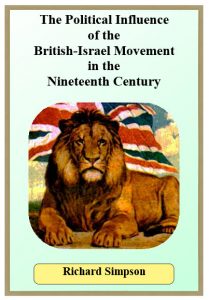On 9th December 1917, Jerusalem fell to the British and in an interview with the Evening Standard, in 1920, Max Nordau, cofounder of the Zionist Movement, in 1897, held ‘we thought that the Messiah would be an individual, but I feel now as if it were a collective entity, and that its name might be the British Nation[1]’.
This one statement vindicated just under 80 years of campaigning for the British-Israel movement, not an Anglo-Jewish organisation as one might expect but a movement that believed the British were the “chosen race”, not the Jews and believed the return to Palestine of the British and Jews together would bring about the Second Coming. Despite the plethora of primary documentation, very little has been written on the role of this movement in the nineteenth century.
Throughout Anglo-Zionist literature and biographies of great Victorian statesmen there is little or no mention of this movement, which according to the Jewish Encyclopaedia (1901) had over 2 million adherents. Despite an extensive press and books, they didn’t quite make it into mainstream politics as an organisation, However, some of their members were very influential and included some of the Royal Family.
From their literal interpretation of Hebrew scripture within an predominantly Anglican umbrella, they certainly thought they knew where the country was going so perhaps that took away their incentive for power. What I have tried to do in this long essay is to assess from a snapshot of 19th century British-Israel publications how they reacted to and tried to influence the political world. How they manipulated biblical prophecy into a “we told you so” result, how British-Israel attempted to show that the writings and addresses of public men bore undersigned testimony to the contentions of their movement offering ‘blind’ evidence and how, strangely, after 80 years of campaigning they were very nearly proved right.
Altholz defines British-Israel as a variety of British nationalism buttressed by biblical references
with all the attributes of a religious movement except religion[2].
The predominate idea of the British-Israel movement was that Great Britain was the home of one or all lost tribes of Israel implying that the inhabitants were God’s Chosen People. It’s prime source of appeal, to advocates, was that it sought to affirm biblical prophecy directed specifically to the Anglo-Saxon race and a unique covenant, with God, marking out the elite nature of that race.
Against a background of British ascendancy, over the course of the nineteenth century, into the largest empire in recorded history, the concept of being a ‘chosen people’ was attractive. This was fuelled by new ideas of evolution and racial superiority imbuing British society with a duty to spread a superior culture, system and way of life to less developed societies epitomized in Rudyard Kipling’s White Man’s Burden. The Royal Geographical Society had claimed, in 1891,
that ‘On the topmost round of the ladder stands the Anglo-Saxon’ an opinion supported by
Gladstone’s assertion that ‘Our race constitutes a kind of universal church in Politics’[3].
